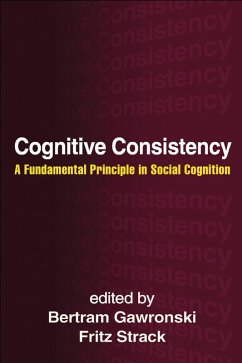Cognitive Consistency (eBook, ePUB)
A Fundamental Principle in Social Cognition
Redaktion: Gawronski, Bertram; Strack, Fritz
82,95 €
82,95 €
inkl. MwSt.
Sofort per Download lieferbar

41 °P sammeln
82,95 €
Als Download kaufen

82,95 €
inkl. MwSt.
Sofort per Download lieferbar

41 °P sammeln
Jetzt verschenken
Alle Infos zum eBook verschenken
82,95 €
inkl. MwSt.
Sofort per Download lieferbar
Alle Infos zum eBook verschenken

41 °P sammeln
Cognitive Consistency (eBook, ePUB)
A Fundamental Principle in Social Cognition
Redaktion: Gawronski, Bertram; Strack, Fritz
- Format: ePub
- Merkliste
- Auf die Merkliste
- Bewerten Bewerten
- Teilen
- Produkt teilen
- Produkterinnerung
- Produkterinnerung

Bitte loggen Sie sich zunächst in Ihr Kundenkonto ein oder registrieren Sie sich bei
bücher.de, um das eBook-Abo tolino select nutzen zu können.
Hier können Sie sich einloggen
Hier können Sie sich einloggen
Sie sind bereits eingeloggt. Klicken Sie auf 2. tolino select Abo, um fortzufahren.

Bitte loggen Sie sich zunächst in Ihr Kundenkonto ein oder registrieren Sie sich bei bücher.de, um das eBook-Abo tolino select nutzen zu können.
This volume provides an overview of recent research on the nature, causes, and consequences of cognitive consistency. In 21 chapters, leading scholars address the pivotal role of consistency principles at various levels of social information processing, ranging from micro-level to macro-level processes. The book's scope encompasses mental representation, processing fluency and motivational fit, implicit social cognition, thinking and reasoning, decision making and choice, and interpersonal processes. Key findings, emerging themes, and current directions in the field are explored, and important questions for future research identified. …mehr
- Geräte: eReader
- ohne Kopierschutz
- eBook Hilfe
Andere Kunden interessierten sich auch für
![The Social Psychology of Power (eBook, ePUB) The Social Psychology of Power (eBook, ePUB)]() The Social Psychology of Power (eBook, ePUB)64,95 €
The Social Psychology of Power (eBook, ePUB)64,95 €![Innovative Stigma and Discrimination Reduction Programs Across the World (eBook, ePUB) Innovative Stigma and Discrimination Reduction Programs Across the World (eBook, ePUB)]() Innovative Stigma and Discrimination Reduction Programs Across the World (eBook, ePUB)48,95 €
Innovative Stigma and Discrimination Reduction Programs Across the World (eBook, ePUB)48,95 €![Social Psychology (eBook, ePUB) Social Psychology (eBook, ePUB)]() Eliot R. SmithSocial Psychology (eBook, ePUB)54,95 €
Eliot R. SmithSocial Psychology (eBook, ePUB)54,95 €![The Psychology of Prejudice (eBook, ePUB) The Psychology of Prejudice (eBook, ePUB)]() Richard GrossThe Psychology of Prejudice (eBook, ePUB)13,95 €
Richard GrossThe Psychology of Prejudice (eBook, ePUB)13,95 €![The Routledge International Handbook of Discrimination, Prejudice and Stereotyping (eBook, ePUB) The Routledge International Handbook of Discrimination, Prejudice and Stereotyping (eBook, ePUB)]() The Routledge International Handbook of Discrimination, Prejudice and Stereotyping (eBook, ePUB)45,95 €
The Routledge International Handbook of Discrimination, Prejudice and Stereotyping (eBook, ePUB)45,95 €![The Psychology of Prejudice (eBook, ePUB) The Psychology of Prejudice (eBook, ePUB)]() Todd D. NelsonThe Psychology of Prejudice (eBook, ePUB)60,95 €
Todd D. NelsonThe Psychology of Prejudice (eBook, ePUB)60,95 €![Advances in Experimental Social Psychology (eBook, ePUB) Advances in Experimental Social Psychology (eBook, ePUB)]() Advances in Experimental Social Psychology (eBook, ePUB)77,95 €
Advances in Experimental Social Psychology (eBook, ePUB)77,95 €-
-
-
This volume provides an overview of recent research on the nature, causes, and consequences of cognitive consistency. In 21 chapters, leading scholars address the pivotal role of consistency principles at various levels of social information processing, ranging from micro-level to macro-level processes. The book's scope encompasses mental representation, processing fluency and motivational fit, implicit social cognition, thinking and reasoning, decision making and choice, and interpersonal processes. Key findings, emerging themes, and current directions in the field are explored, and important questions for future research identified.
Dieser Download kann aus rechtlichen Gründen nur mit Rechnungsadresse in A, D ausgeliefert werden.
Produktdetails
- Produktdetails
- Verlag: Apa Publications
- Seitenzahl: 494
- Erscheinungstermin: 27. Januar 2012
- Englisch
- ISBN-13: 9781609189488
- Artikelnr.: 48028940
- Verlag: Apa Publications
- Seitenzahl: 494
- Erscheinungstermin: 27. Januar 2012
- Englisch
- ISBN-13: 9781609189488
- Artikelnr.: 48028940
- Herstellerkennzeichnung Die Herstellerinformationen sind derzeit nicht verfügbar.
Bertram Gawronski, PhD, is Professor of Psychology at the University of Texas at Austin. His research investigates the mental underpinnings and behavioral consequences of spontaneous and deliberate evaluations of objects, individuals, groups, and social issues. Dr. Gawronski's work has been recognized with honors including the Theoretical Innovation Prize from SPSP, the Career Trajectory Award from SESP, the Early Career Award from the International Social Cognition Network, the Early Researcher Award from the Ministry of Research and Innovation of Ontario, and the Charlotte-and-Karl-Bÿhler Award from the German Psychological Society. He is a fellow of APS, SESP, and SPSP. Fritz Strack, PhD, is Professor of Psychology at the University of Wÿrzburg, Germany. His research focuses on reflective and impulsive processes underlying social behavior. Dr. Strack's work has been recognized with the Theoretical Innovation Prize from the Society for Personality and Social Psychology, the Thomas M. Ostrom Award from the Person Memory Interest Group for outstanding lifetime contributions to theory and research in the field of social cognition, and the Wilhelm Wundt Medal from the German Psychological Society for outstanding achievements in the field of psychology.
1. Cognitive Consistency as a Basic Principle of Social Information Processing
Bertram Gawronski and Fritz Strack I. Mental Representation2. Cognitive Conflict and Consciousness
Ezequiel Morsella
Pareezad Zarolia
and Adam Gazzaley 3. A Neuroscientific Perspective on Dissonance
Guided by the Action-Based Model
Eddie Harmon-Jones
Cindy Harmon-Jones
and David M. Amodio4. Parallel Constraint Satisfaction as a Mechanism for Cognitive Consistency
Stephen J. Read and Dan Simon II. Fluency and Fit 5. Fluency of Consistency: When Thoughts Fit Nicely and Flow Smoothly
Piotr Winkielman
David E. Huber
Liam Kavanagh
and Norbert Schwarz6. Nonpropositional Consistency
Sascha Topolinski 7. Motivational Fit
E. Tory HigginsIII. Implicit Social Cognition8. Balanced Identity Theory:Review of Evidence for Implicit Consistency in Social Cognition
Dario Cvencek
Anthony G. Greenwald
and Andrew N. Meltzoff 9. Implicit Ambivalence
Richard E. Petty
Pablo Briñol
and India Johnson10. Discrepancies between Implicit and Explicit Attitudes
Prejudices
and Self-Esteem: A Model of Simultaneous Accessibility
Christian H. Jordan
Christine Logel
Steven J. Spencer
and Mark P. Zanna IV. Thinking and Reasoning11. Mental Models and Consistency
Philip N. Johnson-Laird12. Cognitive Consistency as Means to an End: How Subjective Logic Affords Knowledge
Arie W. Kruglanski and Garriy ShteynbergV. Decision Making and Choice13. The Dynamics of Ambivalence: Evaluative Conflict in Attitudes and Decision Making
Frenk van Harreveld
Iris K. Schneider
Hannah Nohlen
and Joop van der Pligt 14. Self-Produced Decisional Conflict Due to Incorrect Metacognitions
Lottie Bullens
Jens Förster
Frenk van Harreveld
and Nira Liberman 15. Regret
Consistency
and Choice: An Opportunity × Mitigation Framework
Keith D. Markman and Denise R. Beike 16. Consistency as a Basis for Behavioral Interventions: Using Hypocrisy and Cognitive Dissonance to Motivate Behavior Change
Jeff StoneVI. Interpersonal Processes17. Balance Principles in Attitude Formation and Change: The Desire to Maintain Consistent Cognitions about People
Eva Walther and Rebecca Weil18. Cognitive Consistency in Prejudice-Related Belief Systems: Integrating Old-Fashioned
Modern
Aversive
and Implicit Forms of Prejudice
Bertram Gawronski
Paula M. Brochu
Rajees Sritharan
and Fritz Strack19. Stereotype Confirmation and Disconfirmation
Jeffrey W. Sherman
Thomas J. Allen
and Dario L. M. Sacchi20. Adhering to Consistency Principles in an Unjust World: Implications for Sense-Making
Victim Blaming
and Justice Judgments
Kees van den Bos and Marjolein Maas 21. Interpersonal Cognitive Consistency and the Sharing of Cognition in Groups
Ernest S. Park
R. Scott Tindale
and Verlin B. Hinsz
Bertram Gawronski and Fritz Strack I. Mental Representation2. Cognitive Conflict and Consciousness
Ezequiel Morsella
Pareezad Zarolia
and Adam Gazzaley 3. A Neuroscientific Perspective on Dissonance
Guided by the Action-Based Model
Eddie Harmon-Jones
Cindy Harmon-Jones
and David M. Amodio4. Parallel Constraint Satisfaction as a Mechanism for Cognitive Consistency
Stephen J. Read and Dan Simon II. Fluency and Fit 5. Fluency of Consistency: When Thoughts Fit Nicely and Flow Smoothly
Piotr Winkielman
David E. Huber
Liam Kavanagh
and Norbert Schwarz6. Nonpropositional Consistency
Sascha Topolinski 7. Motivational Fit
E. Tory HigginsIII. Implicit Social Cognition8. Balanced Identity Theory:Review of Evidence for Implicit Consistency in Social Cognition
Dario Cvencek
Anthony G. Greenwald
and Andrew N. Meltzoff 9. Implicit Ambivalence
Richard E. Petty
Pablo Briñol
and India Johnson10. Discrepancies between Implicit and Explicit Attitudes
Prejudices
and Self-Esteem: A Model of Simultaneous Accessibility
Christian H. Jordan
Christine Logel
Steven J. Spencer
and Mark P. Zanna IV. Thinking and Reasoning11. Mental Models and Consistency
Philip N. Johnson-Laird12. Cognitive Consistency as Means to an End: How Subjective Logic Affords Knowledge
Arie W. Kruglanski and Garriy ShteynbergV. Decision Making and Choice13. The Dynamics of Ambivalence: Evaluative Conflict in Attitudes and Decision Making
Frenk van Harreveld
Iris K. Schneider
Hannah Nohlen
and Joop van der Pligt 14. Self-Produced Decisional Conflict Due to Incorrect Metacognitions
Lottie Bullens
Jens Förster
Frenk van Harreveld
and Nira Liberman 15. Regret
Consistency
and Choice: An Opportunity × Mitigation Framework
Keith D. Markman and Denise R. Beike 16. Consistency as a Basis for Behavioral Interventions: Using Hypocrisy and Cognitive Dissonance to Motivate Behavior Change
Jeff StoneVI. Interpersonal Processes17. Balance Principles in Attitude Formation and Change: The Desire to Maintain Consistent Cognitions about People
Eva Walther and Rebecca Weil18. Cognitive Consistency in Prejudice-Related Belief Systems: Integrating Old-Fashioned
Modern
Aversive
and Implicit Forms of Prejudice
Bertram Gawronski
Paula M. Brochu
Rajees Sritharan
and Fritz Strack19. Stereotype Confirmation and Disconfirmation
Jeffrey W. Sherman
Thomas J. Allen
and Dario L. M. Sacchi20. Adhering to Consistency Principles in an Unjust World: Implications for Sense-Making
Victim Blaming
and Justice Judgments
Kees van den Bos and Marjolein Maas 21. Interpersonal Cognitive Consistency and the Sharing of Cognition in Groups
Ernest S. Park
R. Scott Tindale
and Verlin B. Hinsz
1. Cognitive Consistency as a Basic Principle of Social Information Processing
Bertram Gawronski and Fritz Strack I. Mental Representation2. Cognitive Conflict and Consciousness
Ezequiel Morsella
Pareezad Zarolia
and Adam Gazzaley 3. A Neuroscientific Perspective on Dissonance
Guided by the Action-Based Model
Eddie Harmon-Jones
Cindy Harmon-Jones
and David M. Amodio4. Parallel Constraint Satisfaction as a Mechanism for Cognitive Consistency
Stephen J. Read and Dan Simon II. Fluency and Fit 5. Fluency of Consistency: When Thoughts Fit Nicely and Flow Smoothly
Piotr Winkielman
David E. Huber
Liam Kavanagh
and Norbert Schwarz6. Nonpropositional Consistency
Sascha Topolinski 7. Motivational Fit
E. Tory HigginsIII. Implicit Social Cognition8. Balanced Identity Theory:Review of Evidence for Implicit Consistency in Social Cognition
Dario Cvencek
Anthony G. Greenwald
and Andrew N. Meltzoff 9. Implicit Ambivalence
Richard E. Petty
Pablo Briñol
and India Johnson10. Discrepancies between Implicit and Explicit Attitudes
Prejudices
and Self-Esteem: A Model of Simultaneous Accessibility
Christian H. Jordan
Christine Logel
Steven J. Spencer
and Mark P. Zanna IV. Thinking and Reasoning11. Mental Models and Consistency
Philip N. Johnson-Laird12. Cognitive Consistency as Means to an End: How Subjective Logic Affords Knowledge
Arie W. Kruglanski and Garriy ShteynbergV. Decision Making and Choice13. The Dynamics of Ambivalence: Evaluative Conflict in Attitudes and Decision Making
Frenk van Harreveld
Iris K. Schneider
Hannah Nohlen
and Joop van der Pligt 14. Self-Produced Decisional Conflict Due to Incorrect Metacognitions
Lottie Bullens
Jens Förster
Frenk van Harreveld
and Nira Liberman 15. Regret
Consistency
and Choice: An Opportunity × Mitigation Framework
Keith D. Markman and Denise R. Beike 16. Consistency as a Basis for Behavioral Interventions: Using Hypocrisy and Cognitive Dissonance to Motivate Behavior Change
Jeff StoneVI. Interpersonal Processes17. Balance Principles in Attitude Formation and Change: The Desire to Maintain Consistent Cognitions about People
Eva Walther and Rebecca Weil18. Cognitive Consistency in Prejudice-Related Belief Systems: Integrating Old-Fashioned
Modern
Aversive
and Implicit Forms of Prejudice
Bertram Gawronski
Paula M. Brochu
Rajees Sritharan
and Fritz Strack19. Stereotype Confirmation and Disconfirmation
Jeffrey W. Sherman
Thomas J. Allen
and Dario L. M. Sacchi20. Adhering to Consistency Principles in an Unjust World: Implications for Sense-Making
Victim Blaming
and Justice Judgments
Kees van den Bos and Marjolein Maas 21. Interpersonal Cognitive Consistency and the Sharing of Cognition in Groups
Ernest S. Park
R. Scott Tindale
and Verlin B. Hinsz
Bertram Gawronski and Fritz Strack I. Mental Representation2. Cognitive Conflict and Consciousness
Ezequiel Morsella
Pareezad Zarolia
and Adam Gazzaley 3. A Neuroscientific Perspective on Dissonance
Guided by the Action-Based Model
Eddie Harmon-Jones
Cindy Harmon-Jones
and David M. Amodio4. Parallel Constraint Satisfaction as a Mechanism for Cognitive Consistency
Stephen J. Read and Dan Simon II. Fluency and Fit 5. Fluency of Consistency: When Thoughts Fit Nicely and Flow Smoothly
Piotr Winkielman
David E. Huber
Liam Kavanagh
and Norbert Schwarz6. Nonpropositional Consistency
Sascha Topolinski 7. Motivational Fit
E. Tory HigginsIII. Implicit Social Cognition8. Balanced Identity Theory:Review of Evidence for Implicit Consistency in Social Cognition
Dario Cvencek
Anthony G. Greenwald
and Andrew N. Meltzoff 9. Implicit Ambivalence
Richard E. Petty
Pablo Briñol
and India Johnson10. Discrepancies between Implicit and Explicit Attitudes
Prejudices
and Self-Esteem: A Model of Simultaneous Accessibility
Christian H. Jordan
Christine Logel
Steven J. Spencer
and Mark P. Zanna IV. Thinking and Reasoning11. Mental Models and Consistency
Philip N. Johnson-Laird12. Cognitive Consistency as Means to an End: How Subjective Logic Affords Knowledge
Arie W. Kruglanski and Garriy ShteynbergV. Decision Making and Choice13. The Dynamics of Ambivalence: Evaluative Conflict in Attitudes and Decision Making
Frenk van Harreveld
Iris K. Schneider
Hannah Nohlen
and Joop van der Pligt 14. Self-Produced Decisional Conflict Due to Incorrect Metacognitions
Lottie Bullens
Jens Förster
Frenk van Harreveld
and Nira Liberman 15. Regret
Consistency
and Choice: An Opportunity × Mitigation Framework
Keith D. Markman and Denise R. Beike 16. Consistency as a Basis for Behavioral Interventions: Using Hypocrisy and Cognitive Dissonance to Motivate Behavior Change
Jeff StoneVI. Interpersonal Processes17. Balance Principles in Attitude Formation and Change: The Desire to Maintain Consistent Cognitions about People
Eva Walther and Rebecca Weil18. Cognitive Consistency in Prejudice-Related Belief Systems: Integrating Old-Fashioned
Modern
Aversive
and Implicit Forms of Prejudice
Bertram Gawronski
Paula M. Brochu
Rajees Sritharan
and Fritz Strack19. Stereotype Confirmation and Disconfirmation
Jeffrey W. Sherman
Thomas J. Allen
and Dario L. M. Sacchi20. Adhering to Consistency Principles in an Unjust World: Implications for Sense-Making
Victim Blaming
and Justice Judgments
Kees van den Bos and Marjolein Maas 21. Interpersonal Cognitive Consistency and the Sharing of Cognition in Groups
Ernest S. Park
R. Scott Tindale
and Verlin B. Hinsz







